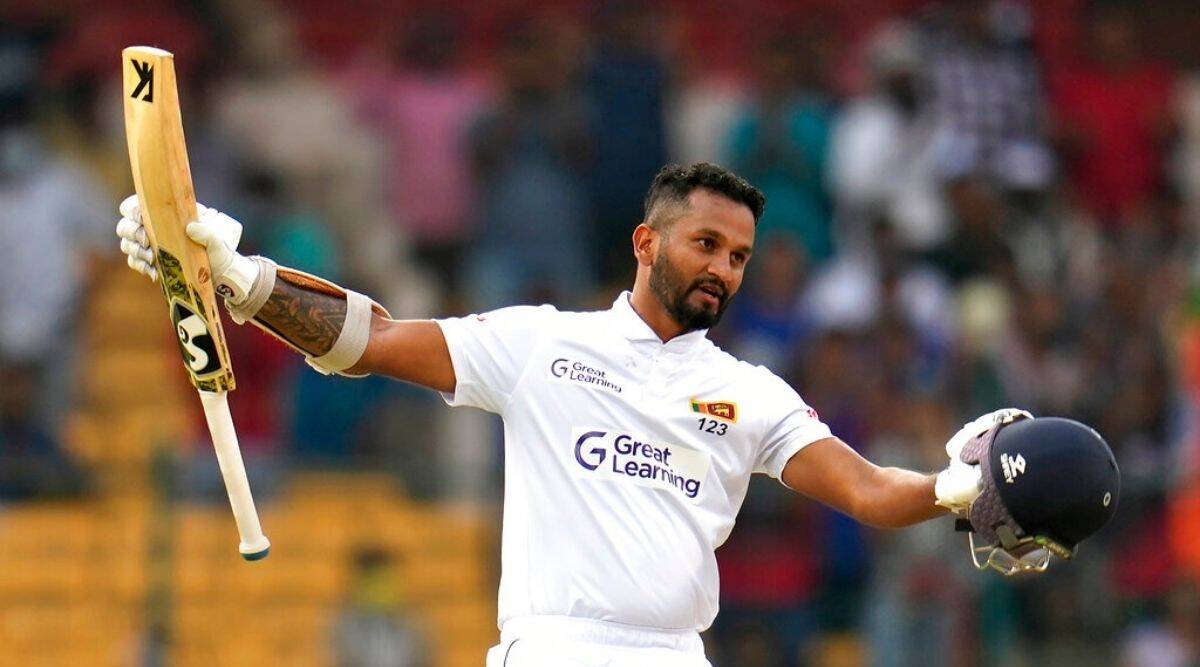Shared News: March 15, 2022 7:11:50 am
Karunaratne has been Sri Lanka’s lone ray of light in the darkest cricketing period in their cricket history. A tragic hero of Sri Lanka’s most tragic times.
Sri Lanka’s captain Dimuth Karunaratne celebrates scoring a century during the third day of the second cricket test match between India and Sri Lanka in Bengaluru, India, Monday, March 14, 2022. (AP Photo/Aijaz Rahi)
Flicking Jasprit Bumrah towards fine-leg, Dimuth Karunaratne set off for the run that would complete his fourteenth hundred. He kept sprinting, battling his weary legs and tired shoulders, not gazing towards the ball. The ball seemed inevitably destined to nudge the ropes, but he did not pause for celebration. His mind was on the double that could retain his strike and not expose Lasith Embuldeniya to Bumrah. Upon completing the double, he turned back, paused, and soaked in the warm applause of the crown under the aluminium skies, yet to break into the twilight.
Yet again, the Sri Lankan captain was doing the running for his team. Yet again, he was the one-man resistance army of the Lankans. Yet again, he ensured that there is something his country’s ardent supporters could treasure from an insipid defeat. Yet again, he has given them hope for a better tomorrow. He has been Sri Lanka’s lone ray of light in the darkest cricketing period in their cricket history. A tragic hero of Sri Lanka’s most tragic times.
The knock was not characteristic Karunaratne. Usually resolute, there were streaky passages, when he could not get bat on the ball, and when he did, it brushed the edges. He survived Ravi Ashwin, by crook and luck, in the first session. Ashwin was in a mood for mischief—turning the ball away from him, into him, keeping it straight, making it skid and shoot, leap and lift. Often, he would stab unsurely, often he would see the ball spin across the phase of his bat, or between his bat and pad, or take the handle and evade the fielder. Both Bumrah and Shami, too, beat his uncertain bat multiple times. Both Axar Patel and Ravindra Jadeja interrogated the steeliness of his resolve.
What.A.Knock 👏
Brilliant from Dimuth Karunaratne to bring up his 💯 on a difficult pitch! This is his 14th in Test Cricket.#INDvSL pic.twitter.com/mH2wZBOYov
— Sri Lanka Cricket 🇱🇰 (@OfficialSLC) March 14, 2022
But survive he did—and that is the essence of his batting. Scoring tough, sometimes ugly runs, nudging, nurdling, tucking and ticking away like a cabbie on a busy street. He began with uncharacteristic aggression—stepping out to Jadeja and drilling him through midwicket. He then attempted a reverse sweep and missed—though later he unfurled a flurry of them—before edging the next ball past the grasp of Virat Kohli at first slip. At no point he seemed fully assured—there was a wicket-at-any-time vibe—not the safety locker as he often is. But he did not care, as long as he survived.
In the end, you might not take home a single stroke he had played, but you might remember the braveheart who defied India for close to three sessions, the man who returned to the pavilion with his jersey drenched in sweat and smeared with dust. On a wider note, that seems to be the whole purpose of his international career. To help Sri Lanka survive the toughest of their transitional phases, selflessly and courageously.

Sri Lanka’s captain Dimuth Karunaratne celebrates scoring fifty runs during the third day of the second cricket test match between India and Sri Lanka in Bengaluru, India, Monday, March 14, 2022. (AP Photo/Aijaz Rahi)
He took over the reins of a team that was in utter mess, a team that had been thrashed six times in a row. He was a stranger to captaincy, but he didn’t shy away from it. At first, he flinched in its burden. He later told Sunday Times (Lanka): “Everything that was happening around us–the allegations of match-fixing, our own performances, the Board issues and so on. And then captaincy entails a lot of responsibilities and. I had to do all that, like team meetings, selections, planning, facing media etcetera. I was not used to these.” And then he led them to the historic series win in South Africa, still the only Asian team that has managed the elusive feat.
Though Sri Lanka never hit those high notes again—and is prone to extremes—Karunaratne has been the guiding light, hiding from the limelight when the team wins but shielding his team when it loses. He didn’t bask in the afterglow of his hundred, but sighed that “I would have been happier if we had won the match.”
His captaincy numbers are not as bad as their performance in this series. He has won and lost an equal number of games (7). He was unflinching in his belief that Sri Lanka could reverse their string of failures. On the field, he might not be the most expressive of captains, but is omnipresent, always talking to his bowlers, always preoccupying the fielders, hiding his angst when they drop catches, always talking to his partners at the other end, guiding them, encouraging. With the bat, he averages 49.4 as captain (10 notches better than his overall figure of 39.5), a staggering number considering that he opens in an era where openers generally have middling averages.
As many as six of 14 hundreds have arrived in 34 outings as captain. Many of them were lost causes, like the 103 at the Wanderers and 107 at the Chinnaswamy. But it is the tragicness of those knocks that makes him all the more endearing. You might not remember a single stroke he played on Monday, but you remember the man with a lion’s heart.


